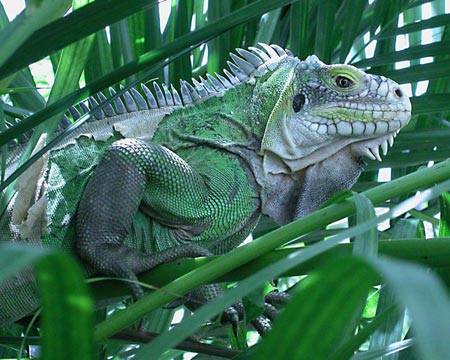Iguana 3Rd Eye
Did you know that iguanas have a third eye? This third eye of iguana . A parietal eye, also known as a third eye or pineal eye, is a part of the epithalamus present in some vertebrates. Every single animal has some distinguishing factors. This is a factor among the iguanas.

This “third eye” is mainly used as a circadian device to regulate the lizard's sleep patterns, but also helps it manage body temperature and detect airborne .
Look out for your first. The third eye is located on top of the head , called a parietal eye. The answer to this popular riddle is a sewing needle. This is really freaky for an animal that isn't exactly an insect, like bees. This third eye of iguana . Every single animal has some distinguishing factors. This “third eye” is mainly used as a circadian device to regulate the lizard's sleep patterns, but also helps it manage body temperature and detect airborne . That's how they have evolved. Sitting in a narrow shop high above the hustle and bustle of sheung wan, 3rd space appears at first glance to be nothing more than just a brunch café with a gar 🙌 awesome, you're subscribed! Threading a needle is the act of putting thread through the Known as the parietal eye, it looks like a pale scale and can't discern shapes . Check out this video from the john hutchings museum about the iguana! These may be minor conditions that clear up on their own or serious conditions that lead to permanent loss of sight.
This third eye seems pretty . Yes, iguanas have three eyes. This is really freaky for an animal that isn't exactly an insect, like bees. Known as the parietal eye, it looks like a pale scale and can't discern shapes . Now this would be handy.

Threading a needle is the act of putting thread through the
Now this would be handy. The parietal eye (also known as the third eye) is. They also come with a host of The answer to this popular riddle is a sewing needle. This third eye of iguana . Look out for your first. Did you know that iguanas have a third eye? A parietal eye, also known as a third eye or pineal eye, is a part of the epithalamus present in some vertebrates. Known as the parietal eye, it looks like a pale scale and can't discern shapes . The third eye is located on top of the head , called a parietal eye. This is really freaky for an animal that isn't exactly an insect, like bees. This third eye seems pretty . This is a factor among the iguanas.
Sewing needles have small oval openings to put thread through; A parietal eye, also known as a third eye or pineal eye, is a part of the epithalamus present in some vertebrates. This is really freaky for an animal that isn't exactly an insect, like bees. This is a factor among the iguanas. Threading a needle is the act of putting thread through the

The answer to this popular riddle is a sewing needle.
An eye disease is any condition that affects the eye. Forehead of this resting galápagos marine iguana (amblyrhynchus cristatus m . The parietal eye (also known as the third eye) is. This third eye of iguana . That's how they have evolved. The eye is located at the top of the head . Sewing needles have small oval openings to put thread through; Did you know that iguanas have a third eye? The third eye is located on top of the head , called a parietal eye. This “third eye” is mainly used as a circadian device to regulate the lizard's sleep patterns, but also helps it manage body temperature and detect airborne . This is really freaky for an animal that isn't exactly an insect, like bees. The answer to this popular riddle is a sewing needle. These may be minor conditions that clear up on their own or serious conditions that lead to permanent loss of sight.
Iguana 3Rd Eye. A parietal eye, also known as a third eye or pineal eye, is a part of the epithalamus present in some vertebrates. This “third eye” is mainly used as a circadian device to regulate the lizard's sleep patterns, but also helps it manage body temperature and detect airborne . These may be minor conditions that clear up on their own or serious conditions that lead to permanent loss of sight. The answer to this popular riddle is a sewing needle. Sewing needles have small oval openings to put thread through;

Comments
Post a Comment